SA’s blood takers ‘hunting extra hours to survive’
Thousands of the lowest-paid workers in the state – from hospital staff drawing blood to prison guards – are angry about staff working “below the poverty line”, saying the public service is “haemorrhaging”.

Public Service Association (PSA) delegate Catherine Male has been drawing blood at the Royal Adelaide Hospital for 11 years.
For the past six, she has received only a one per cent pay rise annually, while rents have risen about 52 per cent.
She works alongside doctors on $200,000 plus salaries.
Male joined about 2000 staff covered under the PSA union on Wednesday calling for the government to “step in and lift our members out of poverty ” as workers gathered at Parliament House from 12pm.

You might like
Fellow staff members rallied in Port Augusta on Thursday as a gruelling year of negotiations stalled when the union rejected the state government’s most recent pay rise offer of 10.5 per cent over three years, saying that would keep workers the lowest paid in the country. The union wants a 20 per cent rise over 18 months.
The plea from workers like Male comes after the doctors union accepted a 13 per cent pay rise and allied health workers accepted 13.5 per cent – both spanning four years.
As a supervisor, Male said she heard concerns from other Phlebotomists – health workers that take blood samples – living below the poverty line.
“The blood takers are always hunting extra hours to survive, they’re always hunting more shifts, always putting their hands up, even though they are fatigued, because the wages are so low and the cost of living is so high,” she said.
Stay informed, daily
“We’re undervalued for our job specs… I get that the doctors are higher up on the chain and then nurses, but we have been sort of forgotten.
“If the bloods aren’t taken, the doctors can’t diagnose their patients or recommend what is their next lot of treatment.”
| Sponsored |
In her current classification, Catherine earns $36.82 an hour, but she had to fight to get there.
“Seven years ago I campaigned to get a new classification…it took 18 months,” she said.
She said workers like her are stuck at pay rates that do not reflect their experience because career progression is not automatic – individual workers have to apply to be moved up the ranks.
PSA delegate and president Anthony Cooke, who works as a correctional officer at Port Lincoln, recently told how a worker called him in Port Lincoln saying “she didn’t know how she was going to feed her kids. That’s just tragic”.

Newly elected PSA General Secretary Charlotte Watson said the public service was “haemorrhaging staff” as they left their low-paid jobs and this was leading to safety concerns.
“Our members have seen a 20 per cent reduction in real wages in the last decade, that’s like losing 20 cents on every dollar you were earning in 2015,” Watson said.
“We are calling on Premier Peter Malinauskas to step in and lift our members out of poverty.”
In addition to higher pay, the union wanted to see improved processes for career progression and penalty rates that aligned with other staff in the same units.
A state government spokesperson said it remained “committed to good faith negotiations with PSA to achieve a new enterprise agreement for salaried workers in the South Australian public sector”.
“Current wages and conditions for these employees were agreed between the PSA and the former Liberal Government through enterprise bargaining in 2021, and were approved by a vote of a majority of employees,” the spokesperson said.
“The Malinauskas Government has made clear that – unlike the former Liberal Government – it is committed to providing a real wage increase above the current rate of inflation. That is reflected in the government’s most recent offer to the PSA.
“The government needs to balance wage increases for public sector employees with responsible economic management to continue to provide essential services to the South Australian community.”
According to the Auditor-General’s annual report tabled in parliament yesterday, the public sector spends about $11.7 billion annually to pay about 123,000 staff across a wide range of government agencies.
The union said the crisis stemmed from past wage deals that were not good enough, overseen by past union leaders, while other emergency service and essential worker unions fought for better outcomes.
Male said since the new Royal Adelaide Hospital was built, Phlebotomists’ rosters changed from six days to seven, but Sunday penalty rates stayed the same as Saturdays at 50 per cent.
“Nursing staff who work on the wards, any hospital wards, get a penalty of 75 per cent for their Sunday rates,” she said.
“The doctors wouldn’t be working for 50 per cent penalty on a Sunday, the nurses don’t work for 50 per cent penalty on a Sunday.
“Their union is a lot stronger, and they’ve been around for a long time as well.”
Pay negotiations are continuing with the nurses and midwives and United Workers Union, which covers staff including hospital cleaners, transport staff and disability support officers.








